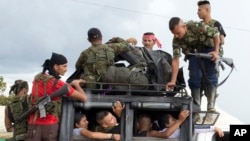The formal peace agreement between the Colombian government and the rebel group FARC that will be signed in the port city of Cartagena on Monday, ending the longest running conflict in the Americas, faces one more hurdle before its implementation.
Colombian President Juan Manuel Santos and FARC rebel leader Timoleón “Timochenko” Jiménez agreed to a cease-fire in June, signaling the end of 52 years of war.
After the signing, the agreement will go before voters for approval on October 2.
U.S. President Barack Obama said he is hopeful the agreement will be implemented.
“I think this is an achievement of historic proportions. It ultimately will be good for the region and the people of Colombia. It took a lot of courage and a lot of hard work by a lot of people," Obama said.
More than 220,000 Colombians have been killed in the war, and more than 7 million displaced.
WATCH: Related video report
Under the accord, high-ranking FARC members can avoid prison if they make reparations as part of a truth-and-reconciliation process.
In return, FARC would become a legitimate political party and be given seats in congress.
But the pact may not end the violence
“I think you would have to be pretty naive [to think] that after this agreement there is all of a sudden going to be no more violence, no more drug trade. This is going to take, under the best scenario; it is going to take a very long time to implement," said Michael Shifter of the Interamerican Dialogue.
On the streets of Cartagena reaction was mixed.
“Colombia needs an opportunity to have peace so that it can go forward and grow and develop the country," said Jorge Rodriguez Sosa.
“Right now there’s a lot of unemployment, and they are going to give a lot of privileges to a lot of people [from FARC] who have caused a great deal of harm," complained Maritza Paraga.
Polls on the referendum have fluctuated wildly, and the outcome could go either way.






